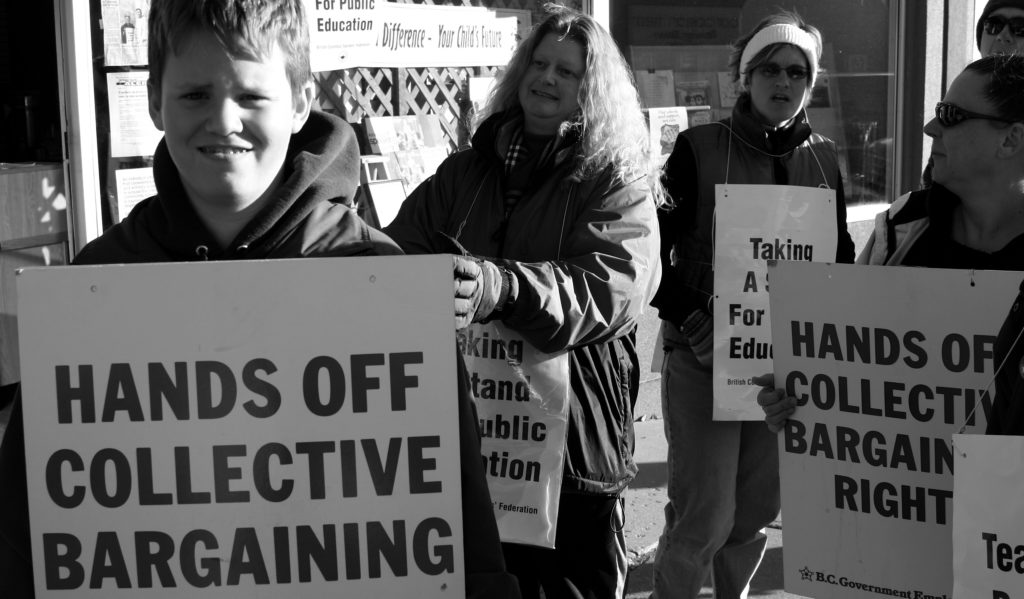This Day in Labor History: May 23, 1977

On May 23, 1977, the Supreme Court issued a decision in Abood v. Detroit County Board of Education, upholding public sector unions collecting union dues from non-members for purposes of collective bargaining. This case, a late blow against anti-union forces before the 1980s attacks on unions began that continue to the present, created the critical precedent that even if a public sector worker opposed a union, so long as that union represented said worker, a so-called fair-share fee could be charged to cover collective bargaining and other business unionist tasks.
By the 1960s, public sector unionism was finally on the rise in the United States. This mostly happened at the state level, though President Kennedy’s Executive Order granting limited rights to government unions is an important date as well. The Postal Workers strike of 1970 was a signal moment for public sector organizing. The Nixon administration caving to them really transformed public sector unionism and government workers organized throughout the decade.
But of course no union ever has 100% support. There are always people in any bargaining unit who resent having their money going toward whatever the union is doing. We can speculate why, but it happens in every union in the country. One of them was Louis Abood, a teacher in Detroit’s public schools. He and his fellow anti-union teachers objected to having to pay union dues for an organization that spent money on political candidates that he did not support. So he sued in Michigan state court in 1969. Now, it’s not as if this issue had not been adjudicated in the past. There were a couple of key cases in the private sector that had already ruled on similar issues–Railway Employees Department v. Hansen (1956) and International Associations of Machinists v. Street (1966). In the latter, the Court ruled that a union may compel fees from a non-member as part of the representation they provided in collective bargaining. That didn’t extend into political donations, but rather for what they received for money. So the only real question here was whether this also applied to the public sector. The Court ruled unanimously that nonmember donations could be coerced for political reasons.
Potter Stewart wrote for the Court:
[The] notion that an individual should be free to believe as he will, and that, in a free society, one’s beliefs should be shaped by his mind and his conscience, rather than coerced by the State … thus prohibit[s] the appellees from requiring any of the appellants to contribute to the support of an ideological cause he may oppose as a condition of holding a job as a public school teacher … the Constitution requires … that such [political union] expenditures be financed from charges, dues, or assessments paid by employees who do not object to advancing those ideas and who are not coerced into doing so against their will by the threat of loss of governmental employment.
Of course, no one was making Abood be a union member. That was his right to choose. However, the vast majority of his union dues were not going to political donations. The Court also ruled 6-3 that he did not have the right to leech off his fellow workers, taking all the salary and benefits that they fought and bargained for, while giving nothing in return. Fair-share fees were to be used for non-political activities–paying for union lawyers, executive director salaries, etc. Abood did not have to support the union’s political activities. His money would not go toward that. But remember that unions are required to bargain for all workers. Whether they are part of the union or not, they have to represent them. If they get in trouble, even if they are nonmembers, unions have the legal obligation to represent them in grievance or disciplinary proceedings if they demand it. So allowing workers to not pay any union dues but getting all the benefits of being a union member is just flat out unjust.
Abood came at a point when public sector militancy was at its height, growing by leaps and bounds each year in the 1970s. The Reagan attack on the air traffic controllers was legendary in 1981, but the 1980s weren’t nearly as bad for the public sector as the private, though strikes in both declined precipitously. So although hard-right conservatives hated the Abood decisions for decades, it wasn’t until the Supreme Court moved significantly to the right with the appointment of Sam Alito that it really became a sold right-wing goal to overturn. As Republicans dominated the courts, cases began to arise to overturn Abood, trusting that contemporary Republicans would vote the party line in the courts. In 2016, it looked like Abood would be overturned, not for any legal reasons, but just that the Republican majority hated unions. Friedrichs v. California Teachers Association was before the Court. And then Antonin Scalia died and it looked like the world was saved. Well….it didn’t work out that way. The appointment of Neil Gorsuch, a man who had famously ruled that a company who fired a trucker for leaving his truck during a snowstorm so he wouldn’t freeze to death was right–and then joked about that decision at Republican conferences–was doom. The anti-union forces were ready with another case immediately, and Janus v. AFSCME in 2018 overturned Abood. It has not been the disaster for the public sector that either unions or anti-union forces expected, but they will be back for more.
This is the 395th post in this series. Previous posts are archived here.


